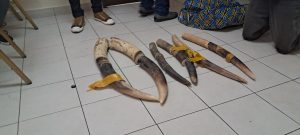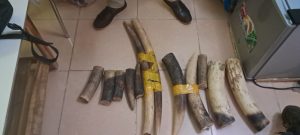During a joint operation conducted by the Anti-Poaching Directorate and the Judicial Police in Libreville, supported by the NGO Conservation Justice, an ivory trafficker was arrested with six ivory tusks. This recent arrest highlights the ongoing scale of wildlife trafficking in Gabon.

On September 13, 2024, a significant operation was carried out in the Gabonese capital, Libreville. A 29-year-old truck driver, E.B.F, employed by a local construction company, was apprehended in possession of six ivory tusks, including one complete pair and two other pairs cut into several pieces. This seizure followed a joint investigation by the Anti-Poaching Directorate and the Judicial Police, in partnership with the NGO Conservation Justice.
Gabon, although rich in biodiversity, has also become a critical zone for wildlife trafficking, particularly in illegal ivory trade. The country is home to more than half of Africa’s forest elephants, a species classified as endangered by the International Union for Conservation of Nature (IUCN). Despite strict laws and heavy penalties, this illegal trade remains highly lucrative and continues to threaten the future of these majestic creatures.
According to initial statements obtained during police interrogations, E.B.F confessed to having received the ivory from a resident of Ndjolé, a town north of Gabon, known for being a transit point for poachers and traffickers. The suspect also admitted that he had come to Libreville with the intent to sell the ivory. After being taken into custody, he was presented to the Prosecutor on September 16, 2024, and was placed in pre-trial detention awaiting his court date.
The illegal ivory trade is severely punished in Gabon. According to the 2012 Gabonese Wildlife Law, individuals involved in ivory trafficking face up to 10 years of imprisonment and a fine of up to 10 million CFA francs. Despite these deterrents, the financial incentives for ivory trafficking continue to wreak havoc on wildlife populations.
The Persistent Challenge of Poaching

The Gabonese authorities, supported by non-governmental organizations such as Conservation Justice and WWF, are stepping up efforts to curb this menace. According to NGO data, more than 250 ivory traffickers were arrested between 2019 and 2023. In 2022 alone, approximately 1,500 kg of ivory were seized, equivalent to over 100 elephants slaughtered.
Often hailed as a stronghold for forest elephant conservation, Gabon has strengthened its legislation in recent years. However, the ongoing demand for ivory, particularly in Asia, continues to fuel a flourishing black market.
This recent seizure of six ivory tusks underscores the critical need to combat the trafficking of protected species and the necessity of constant vigilance to safeguard Gabon’s natural heritage.
The challenge remains immense, but arrests like this demonstrate that joint efforts by authorities and conservation organizations are yielding results. However, as long as there is a demand for ivory, the survival of Gabon’s elephants will remain in jeopardy.
Fanta Mabo








